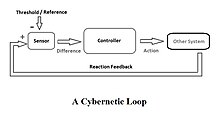
Back Kubernetika Afrikaans Kybernetik ALS سيبرنيطيقا Arabic Kibernetika Azerbaijani Кибернетика Bashkir Кібернетыка Byelorussian Кібэрнэтыка BE-X-OLD Кибернетика Bulgarian ব্যবস্থা পরিচালনা বিজ্ঞান Bengali/Bangla Kibernetika BS

| Complex systems |
|---|
| Topics |
Cybernetics is a field of systems theory that studies circular causal systems whose outputs are also inputs, such as feedback systems. It is concerned with the general principles of circular causal processes,[1] including in ecological, technological, biological, cognitive and social systems and also in the context of practical activities such as designing, learning, and managing.
The field is named after an example of circular causal feedback—that of steering a ship (the ancient Greek κυβερνήτης (kybernḗtēs) means "helmsperson"). In steering a ship, the helmsperson adjusts their steering in continual response to the effect it is observed as having, forming a feedback loop through which a steady course can be maintained in a changing environment, responding to disturbances from cross winds and tide.[2][3]
Cybernetics' transdisciplinary[4] character has meant that it intersects with a number of other fields, leading to it having both wide influence and diverse interpretations.
- ^ Ashby, W. R. (1956). An introduction to cybernetics. London: Chapman & Hall.
- ^ Gage, Stephen (2007-01-01). "The boat/helmsman". Technoetic Arts. 5 (1). Intellect: 15–24. doi:10.1386/tear.5.1.15_1. ISSN 1477-965X.
- ^ "What is cybernetics - NTNU". www.ntnu.edu. Retrieved 2023-04-27.
- ^ Müller, Albert (2000). "A Brief History of the BCL". Österreichische Zeitschrift für Geschichtswissenschaften. 11 (1): 9–30. Archived from the original on 2012-07-22. Retrieved 2012-06-06.
© MMXXIII Rich X Search. We shall prevail. All rights reserved. Rich X Search